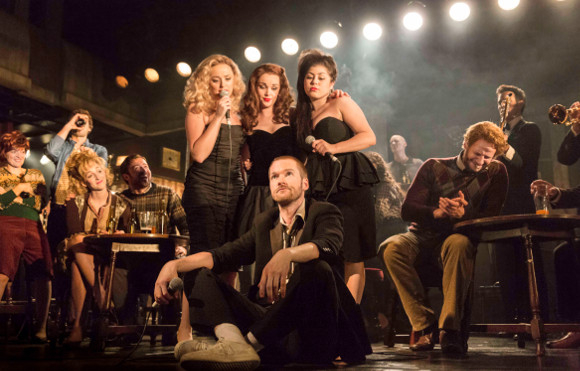The Commitments

I loved the Alan Parker movie, and I loved the novel, Roddy Doyle‘s first, but I have mixed feelings about the new stage musical of The Commitments, which combines elements of both but somehow doesn’t fly off the stage with any great theatrical pezazz in Jamie Lloyd‘s hard-working production.
Partly this is due to the fact that nothing much happens, partly because the book by Doyle himself is too faithful to his own dialogue, which reads better than it sounds (Parker and Doyle’s screenplay was boosted by the duo of Dick Clement and Ian La Frenais), and the one significant component of the movie – sheer joy – is lacking.
There are the great songs, of course, and there appears to be a really clever balance between the onstage performers and the offstage, unseen musicians, deepening the beat and texture of such soul classics as “Knock on Wood,” “I Heard It Through the Grapevine”, “Uptight,” “In the Midnight Hour” and an accelerating version of the Rolling Stones’ “Satisfaction”, which pushes the saxophonist’s diversion into jazz and Charlie Parker off the stage, driven along by the comedy skinhead (Joe Woolmer), who’s installed himself as the group’s drummer on the grounds that Ringo was a useless dork, too.
The show wants to be liked a little too much for its own good, with a strenuousness in the performance that is made bearable when Killian Donnelly as the lead singer Deco – very different from the large rowdy rocker with a Meat Loaf voice, Andrew Strong, in the film – shows what he’s got, and that’s still quite a lot.
Newcomer Denis Grindel, a puppyish Hugh Grant type with a Dublin accent, puts together The Commitments from his parents’ house, finds the group gigs in a church hall and a snooty bar, supervises a few minor squabbles, loses heart (the audience around me were going “aahh, diddums” when he shuffled sweetly into Otis Redding’s “Mr Pitiful”) and bounces back after the guys have fooled him they’ve gone all “country and western” in ten gallon hats and checked shirts.
The personalities on the stage don’t compare all that favourably with the movie cast, but Ben Fox makes a mark as Joey “Lips” Fagan, the ageing Lothario who picks off the girl singers one by one, and Stephanie McKeon can certainly sing up a storm as the first of that trio, Natalie. Ann Yee‘s choreography is serviceable, not brilliant; but that suits given they're meant to be a bunch of amateurs.
The show really comes together in the staging of the group’s breakthrough number for the visiting A and R man: Jon Clark‘s lighting – which blazes into the audience’s eyes from the off – can sculpt the performers in a misty nimbus, and mix the white light with a steamy red; partly because the stage is at last cleared of designer Soutra Gilmour‘s cumbersome, decorated trucks.
The biggest weakness, though, is a disconnect between the lives and spirit of the characters and their oft-reiterated claim that “soul is the politics of the people,” somehow supposing that eating bags of fish and chips while cruising through “Grapevine” is a sign of revolutionary fervour.
Fans won’t be deterred by this, and there is a jump-up-and-join-in extended finale that characterises all the best “reach out” jukebox musicals, a la the genre's forerunners Jersey Boys or Mamma Mia!.
Read our interview with cast member Killian Donnelly











